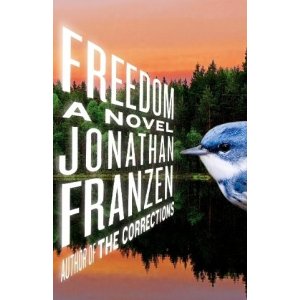(Almost) Modern-day America
Paperback: 562 pages
Publisher: HarperCollins (Aug 1 2010)
ISBN-10: 0374532575
ISBN-13: 978-0374532574
Have you ever finished a book and regretted it, feeling like you already miss the characters? It happens to me all the time…but not with Freedom. I can honestly say I didn’t like any of the characters in the book. They’re all self-centered, rude and hypocritical. I suppose the only one who’s not completely self-centered is Walter Berglund, the environmental activist, but it’s hard to admire his shutting out his family for the sake of his work.
But I’m getting ahead of myself. The book is about an American nuclear family; but the college-educated parents (I figure I’d better use American terminology) and kids, a big renovated house and upper-middle class neighbourhood (I refuse to remove that “u”) don’t hide the mountain of issues these people have.
The timeline jumps all over the place. It starts with a detailed summary of the family’s first years together, including the tensions between father Walter and son Joey. Next is an autobiography written by mother Patty for supposedly therapeutic reasons, a text which makes a play in the plot near the end of the book. Topics covered include, but are not limited to: an unfortunate first sexual experience, being a basketball star who doesn’t matter to her arts-obsessed family and becoming best friends with her stalker. And Patty reveals just what any child wants to hear–that it is possible and does occasionally happen that a parent loves one kid more than another.
Then comes an account of Walter’s life told in the third person since, as I mentioned earlier, he’s the least self-involved person in the book. Even if he weren’t, it could be forgiven, knowing his background as the hard-working and determined son of a layabout alcoholic.
Finally, a focus on Joey’s life, screwed up as it might be. Having been inadvertently tied at a young age to his indomitable soul mate, also known as Connie, the girl next door, and written off by his father, he sets off to make his own way in the world. Hypocrisy is evident when Joey, who always hated being dependent on his father and is determined to make is own fortune, has no problem taking cash from his doting mother.
The only member of the family who plays a minor role in the novel is daughter Jessica, presumably because she’s the most “normal” and, therefore, boring. Her space is filled by Walter’s best friend and roommate from university, Richard. The unwilling rock star is beset by fans and fame late in life but can’t forget Patty, the one he pushed away and who married his best friend.
Franzen makes no secret of taking his inspiration from Tolstoy’s War and Peace, referencing it in the novel to make a statement about how art influences life. Patty, wanting to better educate herself, reads it at a critical point and lets it manipulate her towards a decision about the torch she’s carried for Richard for years.
Franzen shys away from nothing. Every dirty fact of life, sex, love and psychology is in there to make the reader uncomfortable. Every thought you wish had never occurred to you is in there with others that never did. Monogamy is a joke in this society, to these people and, in some cases, they aren’t afraid to admit it.
The beginning of the book is much better than the end, if you ask me. I loved the extended monologues by the Berglund family and their neighbours as the author introduces us to the cultural and political setting. At that point, it’s hard to see where the story is going and I liked it.
